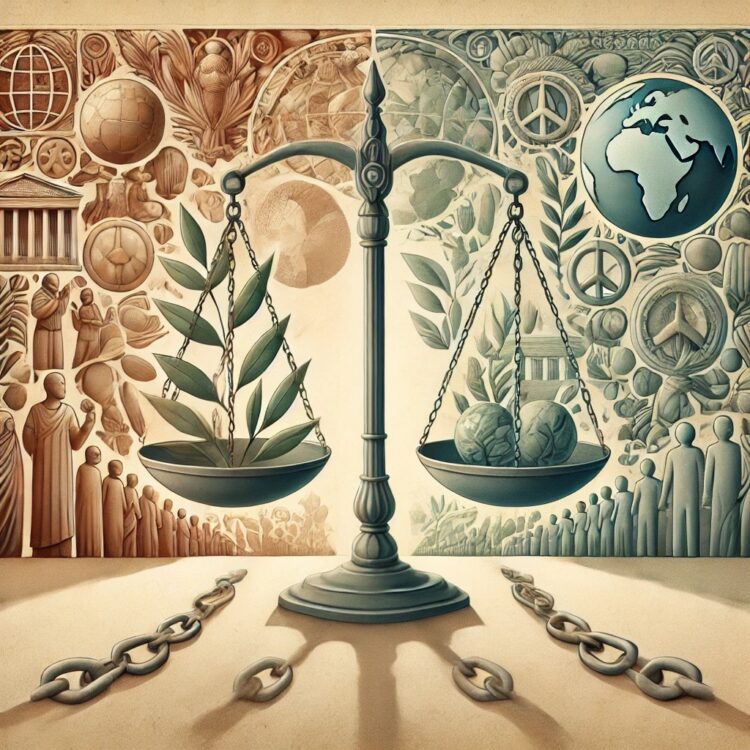
By Michael J. Tyler
In recent years, the discourse surrounding human rights violations in Israel and the occupied Palestinian territories has often been overshadowed by allegations of anti-Semitism. This conflation has stifled meaningful debate, hindered accountability, and perpetuated misunderstanding. Criticising a nation-state for its actions is not equivalent to prejudice against its people or their shared identity. To clarify this crucial distinction, it is essential to explore the nature of legitimate critique, the political realities of nation-states, and the moral imperative to uphold human rights universally.
Criticism of a Nation-State Is Not Criticism of a People
Israel, like any other nation-state, is a political entity governed by laws, policies, and leaders who make decisions affecting both its citizens and others under its jurisdiction. Critiquing these decisions—whether on settlements, military actions, or discriminatory laws—is an exercise in accountability and international law, not an attack on Jewish people or Judaism. Just as criticising the policies of Saudi Arabia is not inherently Islamophobic, and critiquing China’s actions does not equate to Sinophobia, holding Israel accountable for human rights violations must be understood within the framework of policy critique.
Anti-Semitism is a vile and persistent form of racism that must be condemned unequivocally. However, equating all criticism of Israel with anti-Semitism trivialises the real dangers faced by Jewish communities worldwide. It weaponises a legitimate concern against bigotry to shield a nation-state from scrutiny. This misrepresentation undermines both the fight against anti-Semitism and the global pursuit of justice and equality.
The Role of International Law
The framework of international law is clear: no nation is exempt from its principles. The Fourth Geneva Convention prohibits the transfer of a civilian population into occupied territory, a standard frequently cited in discussions about Israeli settlements in the West Bank. The United Nations and numerous human rights organisations, including Amnesty International and Human Rights Watch, have documented violations of international law by Israeli authorities, from forced evictions in East Jerusalem to disproportionate military responses in Gaza.
Criticising these actions aligns with the global commitment to human rights and the rule of law. This commitment obliges states, organisations, and individuals to address violations wherever they occur, irrespective of the perpetrator’s identity or history. To shield one nation from such scrutiny undermines the universality of these laws and creates a dangerous precedent of selective accountability.
The Moral Imperative to Speak Out
Silence in the face of injustice is complicity. The lessons of history, including the atrocities of the Holocaust, compel us to stand against oppression and defend the dignity of all people. This moral imperative does not discriminate; it applies equally to Palestinians facing displacement as it does to Jewish communities confronting anti-Semitism.
Speaking out against human rights violations in Israel and the occupied territories is not a betrayal of Jewish people; it is an act of solidarity with all who suffer under oppression. It is an acknowledgment that human rights are universal and indivisible, and that justice for one group cannot come at the expense of another.
The Dangers of Conflation
Conflating criticism of Israel with anti-Semitism has far-reaching consequences. It chills free speech, deters advocacy, and polarises dialogue. Activists, scholars, and politicians who critique Israel’s policies often face smear campaigns and professional repercussions, discouraging others from raising valid concerns. This dynamic undermines democratic principles and silences voices essential to fostering a just resolution to the Israeli-Palestinian conflict.
Moreover, this conflation risks alienating individuals genuinely committed to combating anti-Semitism. When accusations of anti-Semitism are misapplied, they lose their potency and credibility, weakening efforts to address genuine instances of hate and discrimination.
Conclusion
Criticising Israel’s breaches of human rights is not anti-Semitism; it is a necessary part of holding power accountable and promoting a more just world. This distinction must be recognised and respected to ensure that the fight against anti-Semitism and the pursuit of human rights remain robust and uncompromised.
As a global community, we must reaffirm our commitment to universal principles of justice and equality, ensuring that no nation, group, or individual is beyond reproach. Only by maintaining this integrity can we hope to create a future where human dignity is respected for all.
About the Author
Michael J. Tyler is an Australian advocate, writer, and mediator specialising in alternative dispute resolution and human rights. With a diverse academic background spanning law, marine biology, and media, Michael is committed to fostering meaningful dialogue on social justice issues and promoting a fairer, more equitable world.